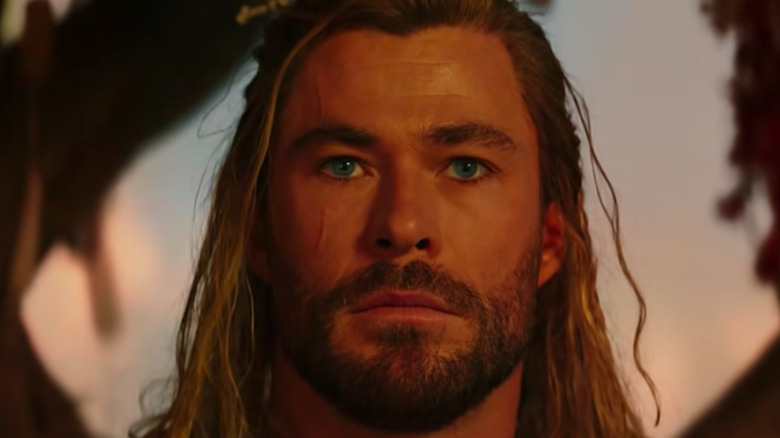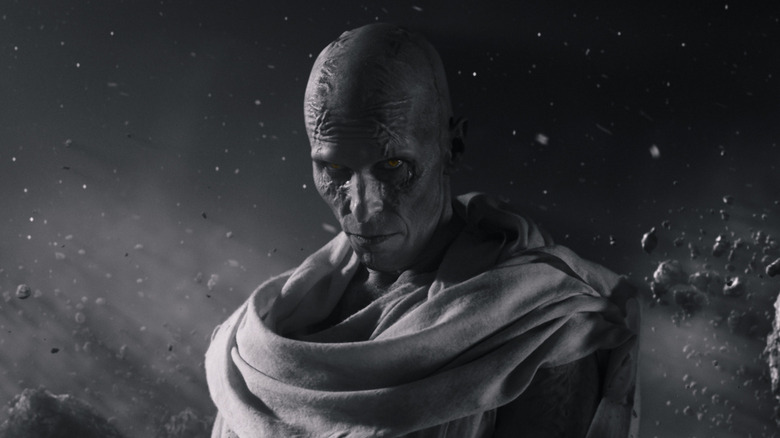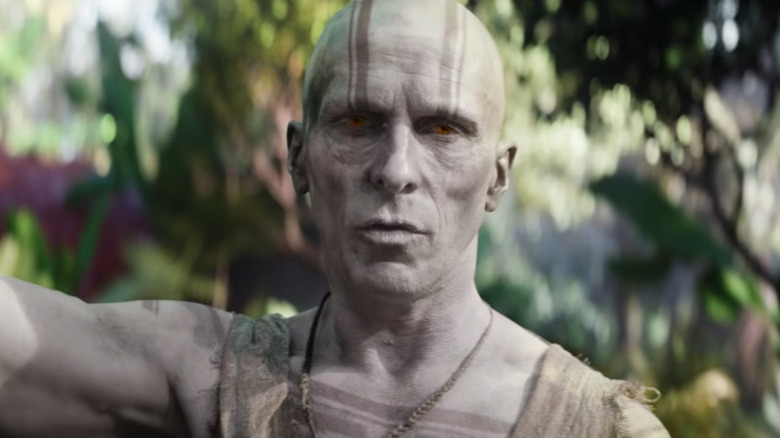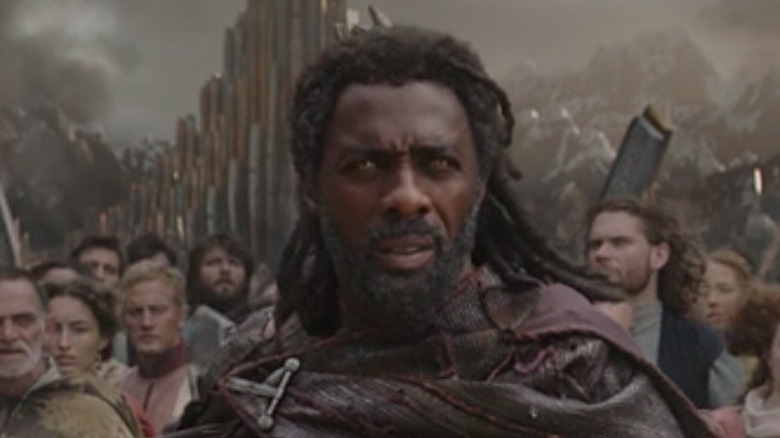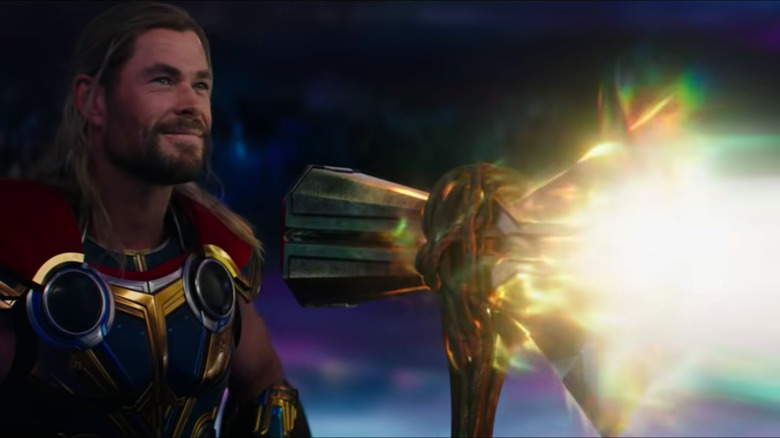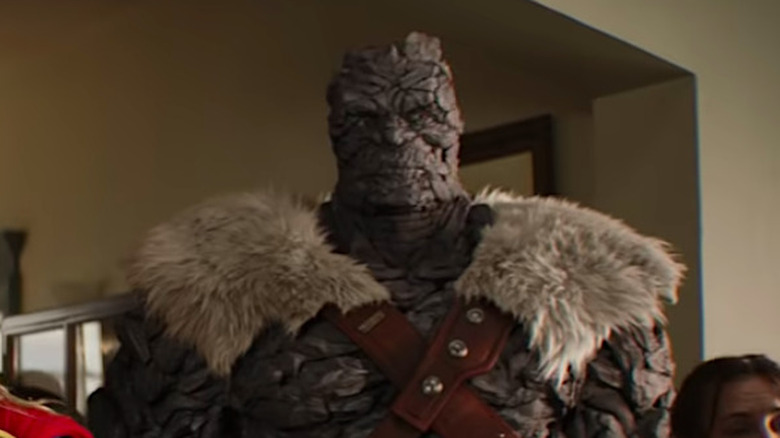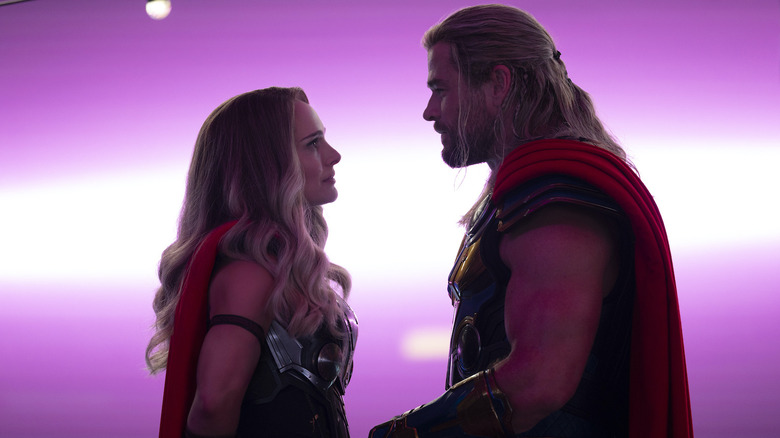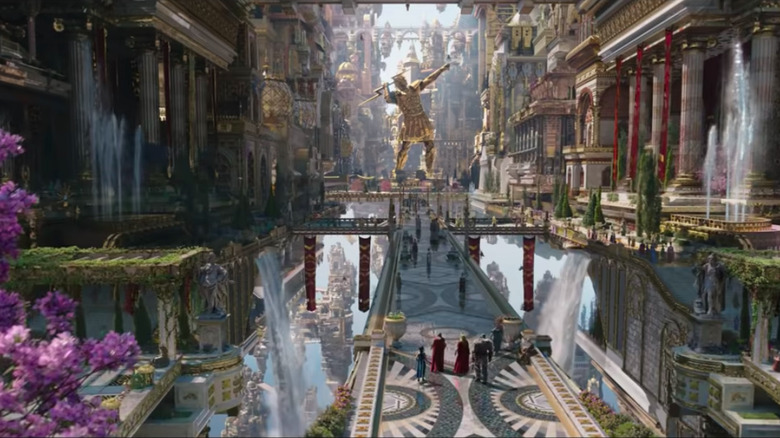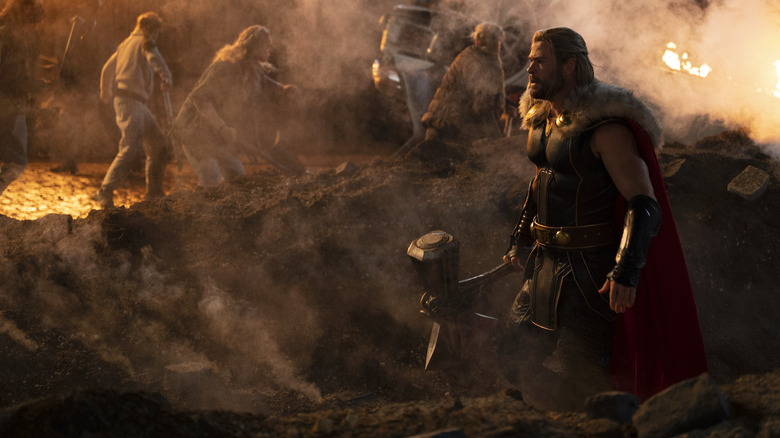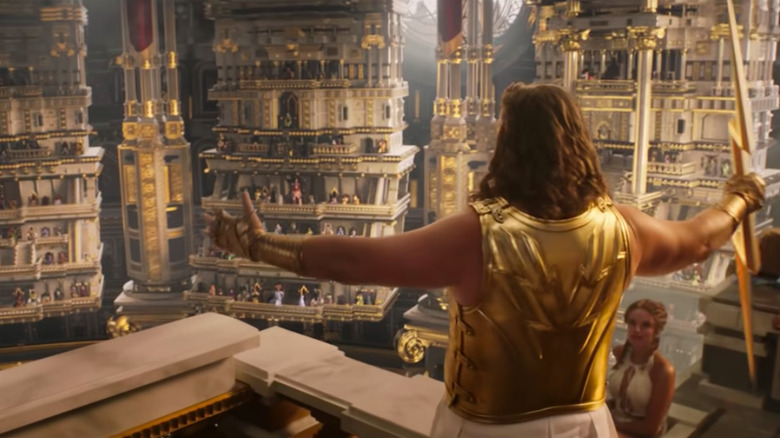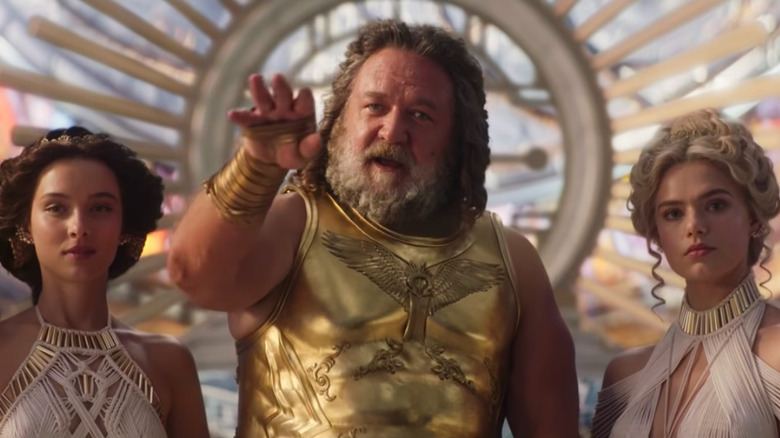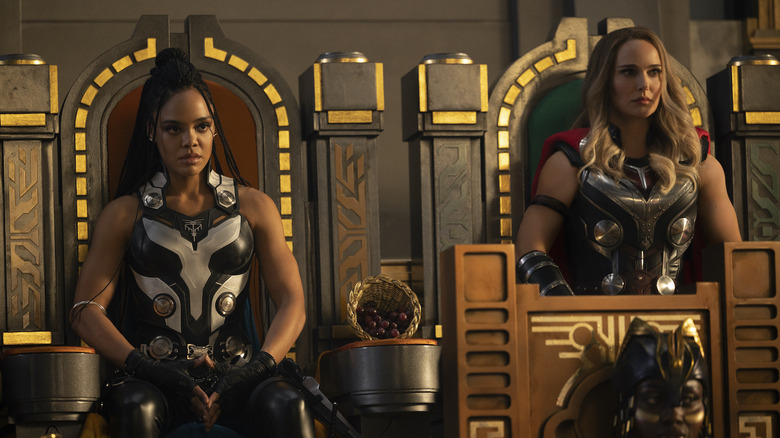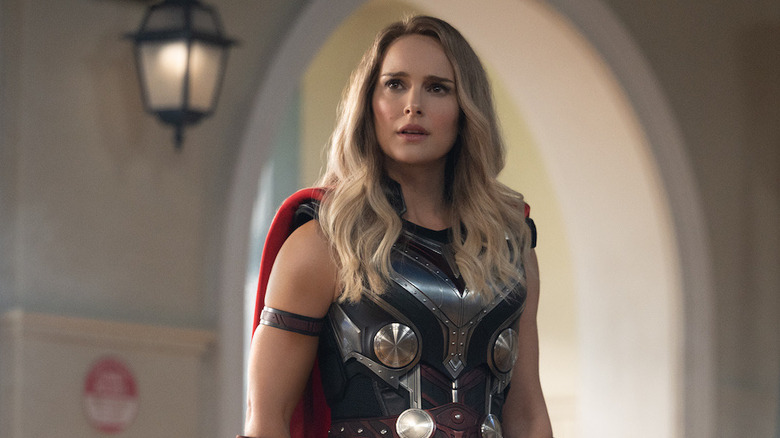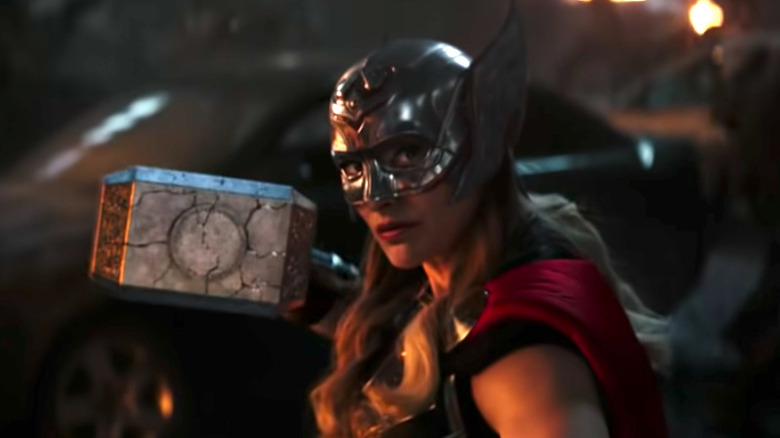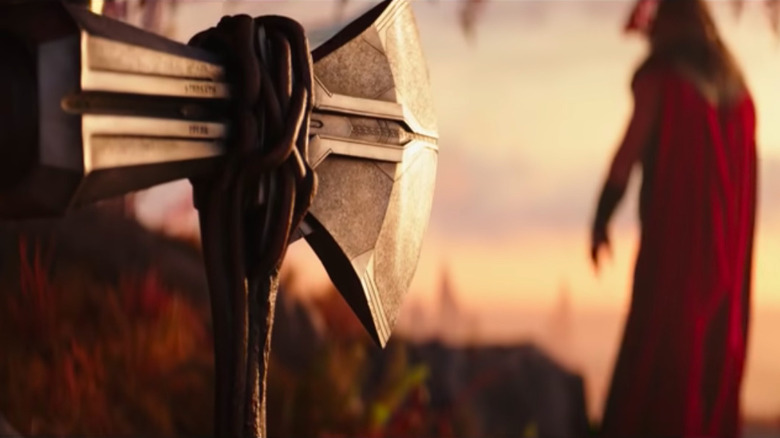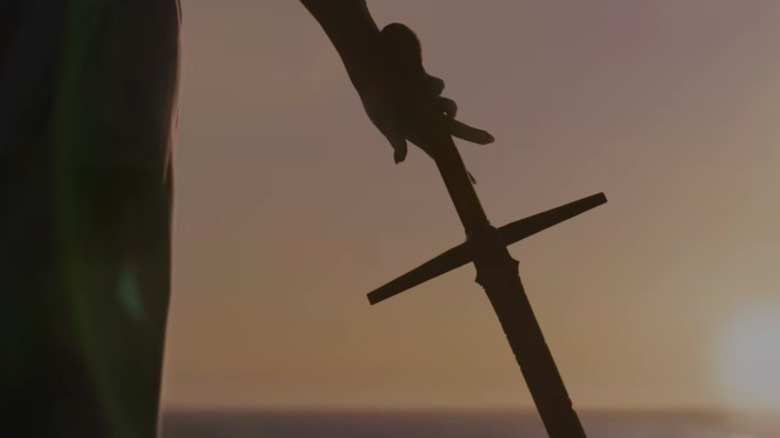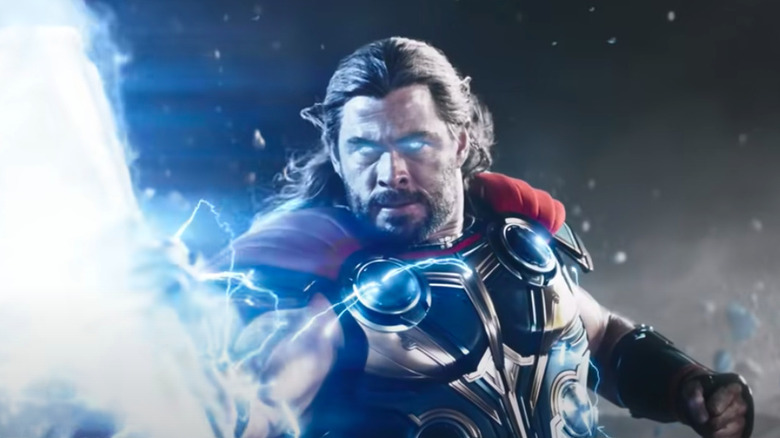Confusing Moments In Thor: Love And Thunder Explained
Thor's fourth solo adventure "Thor: Love and Thunder" has finally hit movie screens, and it's exactly what many fans of the space Viking were hoping for. The movie brings a wave of neon energy to the Marvel Cinematic Universe that builds on the quirky, amusing sensibility that was established in "Thor: Ragnarok." But this time, Thor has an unexpected new ally: Jane Foster (Natalie Portman) the ex-girlfriend he still pines for who has, by some strange magic, managed to attain the favor of Thor's former weapon Mjolnir and become the Mighty Thor.
If that weren't enough to throw the God of Thunder for a loop, a new enemy has arisen, Gorr the God Butcher (Christian Bale), and his goal is nothing less than the eradication of every god in the universe, including Thor. That makes Thor's "Love and Thunder" journey especially personal, and while the movie offers plenty of laughs, it also includes more than a few moments of terror and heartbreak as well. It's a strong entry in the "Thor" series as well as the MCU as a whole, but that doesn't mean everything about "Thor: Love and Thunder" makes sense. In fact, there are more than a few moments throughout the film that may confuse viewers so much that they'll scream like one of the movie's giant space goats. Here are a few of them. Spoilers ahead!
When (and where) does the prologue involving Gorr happen?
Gorr and his daughter are the first people seen in "Thor: Love and Thunder." They're walking alone through a barren desert, dying of starvation and thirst. Yet, through it all, Gorr continues to pray to their god Rapu, who they also bear marks of devotion to, including in the tattoos that adorn their bodies and the jewelry they wear.
All of this sets up the story of how Gorr loses his faith and becomes the God Butcher, however, because Gorr and his daughter appear to be human, viewers may be confused about which earthly desert they're in, and because their tattoos and clothing appear to come from another time or ancient culture, viewers may also be confused about when these scenes take place. While the movie doesn't provide an explanation, the comics offer some clues.
It turns out Gorr and his daughter aren't lost in the Gobi, Sahara, or even on Tatooine. Instead, they're on an inhospitable unnamed planet that has systematically taken the lives of all of Rapu's followers, with the exception of Gorr and his daughter. So even though they look human, Gorr and his daughter are aliens.
The question of when the prologue takes place is more difficult to answer. "Love and Thunder" leaves this to viewers' imaginations, however in the comics, Gorr lost his faith thousands of years ago, and even meets Thor for the first time in the Middle Ages. While Thor doesn't encounter Gorr until the present day in the movie, based on the comics, it's fair to believe that Gorr has been on his god-killing quest for centuries, if not millennia before that.
Where did the oasis Gorr finds in the desert come from?
Despite Gorr and his daughter's obvious devotion to their god, Gorr's daughter eventually dies, leaving Gorr alone and bereft. If circumstances were different, Gorr would likely have met his fate shortly afterward. Instead, he comes upon an oasis in the desert full of lush vegetation, a burbling brook, and a pile of delicious fruit. Gorr can't seem to believe his good luck and quickly takes advantage of the bounty in front of him, but he's soon interrupted by a man who scoffs at his desperation for food and water. When Gorr recognizes him as Rapu (Jonny Brugh), he swears his allegiance and asks for his eternal reward. But the god ridicules him for believing he's owed anything for his faith. Needless to say, after everything he's endured, Gorr doesn't take this well.
This sequence is likely to leave many viewers wondering where the oasis Gorr discovers could have arisen from. After all, it doesn't seem possible that a lush oasis, especially one where gods hang out, has just been sitting in the middle of the desert on Gorr's planet this whole time. Based on the evidence in the movie, the oasis is probably from another place and has been re-located to Gorr's planet by magic, specifically the magic of the Necrosword.
Gorr is led to the oasis by a voice whispering to him and when he arrives there, Rapu informs him that they're celebrating because they've just vanquished the previous owner of the Necrosword, a weapon capable of killing divine beings. In the world of "Thor: Love and Thunder," it seems the Necrosword is also capable of finding a new individual to wield it — and it's found the perfect option in Gorr. It's the Necrosword's whispers that call to Gorr, and when Gorr realizes Rapu has done nothing to help him or his family in life or death and turns against him, the Necrosword transports itself into Gorr's hand so he can take out his former god. So while it's unclear where the oasis originated, all signs point to the Necrosword being the force behind ensuring it appeared in Gorr's pathway.
Wait, since when did Heimdall have a son?
The short answer is that Heimdall's son came into being when he became necessary to advance the plot of "Thor: Love and Thunder." Heimdall (Idris Elba) is one of the most popular characters in the "Thor" franchise. The guardian of Asgard's Bifrost and the overseer of the Nine Realms, Heimdall was a loyal servant of Odin (Anthony Hopkins), became the defender of the fleeing Asgardian people after Hela (Cate Blanchett), took over the throne in "Thor: Ragnarok," and was killed by Thanos in "Avengers: Infinity War."
Through all of that, there was never any hint about Heimdall's life outside of his job and the political machinations of Asgard. So while his son's sudden inclusion in "Thor: Love and Thunder" might confuse some viewers, it's certainly possible that Heimdall had a child he never mentioned. Still, it's strange he never came up in prior films, especially since Thor seems to know the boy, who calls himself Axl (Kieron L. Dyer), fairly well and recognizes him immediately. Plus, Heimdall never had a child in the comics, furthering the case for Axl being mostly born of necessity.
As fans learned in "Ragnarok," Heimdall was able to share his vision with Thor to show him what was happening on Asgard. Because Axl is Heimdall's son, he has the same power, which enables Thor to quickly determine where Axl and the other children of Asgard are being held after they're kidnapped by Gorr. It's a handy power and plot device, and with Heimdall out of the picture, it seems to introduce Axl became the easiest solution for bringing it back for "Love and Thunder."
Why does Stormbreaker seem like a sentient being?
After Hela shattered Thor's hammer Mjolnir into pieces at the beginning of "Ragnarok," Thor needed a new weapon to take on Thanos in "Infinity War." So with Groot (Vin Diesel) and Rocket Raccoon (Bradley Cooper), he traveled to Nidavellir to ask Eitri the Dwarf (Peter Dinklage) to forge Stormbreaker for him. Thor and his allies then heroically flew in mid-battle to join the fight against Thanos on Earth, and for a moment at least, Thor demonstrated the awesome power of his shiny new weapon. Stormbreaker remains Thor's weapon of choice in his latest adventure, but when Jane shows up wielding Mjolnir, Stormbreaker exhibits all the signs of being jealous of Thor's close relationship with his ex-weapon.
While it's a hilarious take on a love triangle, some viewers may find themselves wondering why Stormbreaker seems sentient while Mjolnir never did. The answer has been supplied by "Thor: Love and Thunder" director Taika Waititi, who pointed out that the ax's handle was made out of Groot's arm. Groot is currently a teenager, making his former arm a teenager too. Because of its connection to Groot, not only does Stormbreaker have a certain level of consciousness, like many teenagers, it's also fairly temperamental. As a result, it can't hide its feelings of jealousy as it competes with Mjolnir for Thor's affections. Its adolescent peevishness even extends to the Bifrost, as sometimes Stormbreaker enables Thor to travel through the Bifrost without a problem but other times, if it's feeling slighted or angry, it may cut off the Bifrost while Thor's traveling through it, leaving the god of thunder to crash back to Earth.
Korg only talks about men in his species, but are there any women Kronans?
The rock being Korg (Taika Waititi) was introduced in "Thor: Ragnarok" as a fighter in the Grandmaster's (Jeff Goldblum) contest of champions on Sakaar. After Thor sets Korg and the other gladiators free, Korg travels to Asgard and helps Thor evacuate the planet as he brings about Ragnarok. Since then, Korg and Thor have forged a fast friendship, with Korg taking up residence in New Asgard and supporting Thor through the existential crisis he confronted after Thanos' victory in "Infinity War."
In "Love and Thunder," Korg has become an important part of Thor's team and Thor's main advocate, sharing the tale of the space Viking's exploits with the people of the planets they visit. Given his important place in Thor's life, it's no surprise when Korg joins Thor on his mission to stop Gorr.
Yet, while their mission may be dire, they still have some downtime along the way, and during one lull in the action, as Thor talks up Jane, Korg tells Valkyrie the tale of how his two dads created him by joining hands in a river of lava for several days and melting part of themselves together. And later in the movie, Korg reveals that he's found a partner, the mustachioed Dwayne, who he plans to do the same thing with.
Some viewers may be perplexed by the lack of women of Korg's species, the Kronans, that Korg mentions. It turns out Korg's description of Kronan reproduction is lifted straight out of the 2008 comic "World War Hulk Aftersmash: Warbound #4," and, as he implies, there are no female Kronans. In fact, the Kronans could be considered genderless, but since Korg is referred to as a "he" and he identifies his parents as his dads, in the MCU at least, it's safe to say Kronans are all men.
Why don't Jane and Thor agree about how long they were broken up?
Jane and Thor fell in love during 2011's "Thor," but after breaking the Bifrost, they didn't see each other again until two years later in "Thor: The Dark World." After that, Jane and Thor embarked on a romance, but as Korg explains in "Love and Thunder," soon fear and their commitment to their jobs led to their break-up. While it's not entirely clear when this happened, we know Jane and Thor were no longer together by "Ragnarok," and their reunion offers an opportunity for further clarity.
When Thor and Jane meet again, Jane casually asks how long they've been apart, pegging it at "three, four years," but Thor knows exactly, and it's far longer than Jane realizes, specifically "eight years, seven months, and six days." Some fans may be confused about why the discrepancy between their recollections of the timing of their break-up is so different, but there are a couple of potential explanations. On the one hand, it points to the fact that Thor has been literally counting the days since they parted, while Jane has had other things on her mind, indicating Thor's been holding a much bigger and brighter torch for Jane than she has for him.
However, Jane's belief that it's been somewhere between three and four years suggests she may have been snapped away by Thanos — meaning that in her mind, their break-up is far more recent than it is for Thor because, for five of the eight-plus years since, she technically didn't exist. It's a subtle nod to Thanos' actions that makes Jane's "Love and Thunder" arc all the more tragic.
Why has Thor never been invited to Omnipotence City?
"Thor: Love and Thunder" introduces several new locations, but perhaps the most impressive is Omnipotence City, an embassy for gods of all kinds from across the universe. Yet, while all gods are welcome there in the comics, that isn't the case in the film. Thor indicates that their attendance at the meeting of gods where they plan to ask for Zeus' (Russell Crowe) help to take on Gorr is by invitation only. In fact, they're so concerned about getting kicked out before they can make their request, that they don the clothes of a set of gods that were invited as a disguise. (Valkyrie refuses to explain what she did to those gods to acquire their clothes.)
Still, it's hard not to wonder why Thor hasn't been invited to Omnipotence City before. After all, he's a god from a pretty powerful family that's made waves across the Nine Realms. Moreover, in the comics, Thor once went to Omnipotence City to seek information about Gorr's whereabouts from its vast library. Yet, while his destination in the movie is the same, Thor's not exactly welcome in the MCU's version of Omnipotence City, In fact, while Thor may seem like a big deal in other contexts, Zeus indicates he doesn't think too highly of the space Viking, noting that once Odin died, he was under the impression his whole pantheon was gone. In the comics, Zeus and Odin became friends and Zeus even serves as a mentor to Thor, but clearly, there's no such goodwill between them in the MCU. Perhaps that's why Thor has never landed an Omnipotence City invite before.
Why is Thor so different from the movie's other gods?
When we first met Thor over a decade ago, he reveled in war and sought out fights even when there was no need. But after Odin stripped him of Mjolnir and banished him to Earth, Thor learned his lesson: His ability to help people was his true superpower. It was this realization that led him to join the Avengers and become a defender of Earth and its people. Yet, the other gods we meet in "Love and Thunder" don't seem to share Thor's concern for the greater good.
From Gorr's god Rapu to Zeus in Omnipotence City, the gods come across as vain and complacent and they believe mortal beings' only purpose is to worship them. This is a bit confusing. After all, Thor's nothing like these other gods. Part of the reason for this may be simply that Thor's Viking background means he was an especially talented fighter and it gave him a skill that he could use to benefit others, a skill that many other gods may not share. The dumpling god Bao, who Thor and his allies encounter in Omnipotence City, certainly isn't going to be jumping into battle anytime soon, although he seems like a perfectly pleasant fellow.
That said, gods like Zeus used to be powerful forces on Earth but aren't anymore. It's possible that just as their worshippers have rejected them, they've turned against their former worshippers. However, because Thor and Odin never seemed to care about amassing worshippers, losing them may not have impacted the father and son in the same way. Instead, at least for the latter part of his life, Odin valued helping others, a value he imparted to his son, but one that the other gods in "Love and Thunder" don't seem to share.
Shouldn't Zeus call all gods to Omnipotence City to avoid its location getting to Gorr?
When Thor gets the attention of Zeus in Omnipotence City and asks him to raise an army of gods to help him take on Gorr, Zeus is unwilling to help, arguing that the gods are safe where they are. The only measure he's willing to take to protect the gathered deities from Gorr is to force Thor and his allies to stay there so Gorr can't learn the location of Omnipotence City from them. Yet, some fans may scratch their heads at this, not because Zeus' reason for holding Thor is flawed but because if he wants to keep Thor in Omnipotence City, he should want to do the same with every other god in existence.
After all, if Thor knows where Omnipotence City is, it stands to reason that all the other gods do too. So even if Zeus doesn't want to take on Gorr, if he wants to ensure none of the gods Gorr goes after reveals the location of Omnipotence City, it seems he should send someone to gather up any gods who aren't already there. That way the gods will all be safe in Omnipotence City and Gorr will never learn their location. It's a win-win, and since Thor is the only god who seems to want to confront Gorr, Zeus probably wouldn't get much pushback to keeping all the gods in the City.
Zeus seems to die but doesn't, so can a god like him actually die?
When Zeus tries to have his soldiers take Thor and his friends into custody so they can't leave Omnipotence City, it leads to a brutal brawl. Yet, despite all the gods surrounding them, the only one that helps the soldiers is Zeus. Zeus wreaks plenty of havoc with his weapon, Thunderbolt, including almost obliterating Korg. When he attempts to take Thor out with it, though, Thor catches it and throws it back at Zeus, seemingly landing a killing blow to the shock of the other gods watching.
Despite appearing to meet his demise, however, it's revealed in a mid-credits scene that although Zeus was wounded, he's far from deceased. This could lead some to wonder if Zeus, the seeming king of all the gods, can truly die at all. Zeus is still alive in the comics, so there's no definitive evidence one way or another. Plus, we know that, regardless of how poetic it might have been, Zeus' own weapon can't kill him, which likely means no other divine weapon can either. However, even though Zeus is unwilling to seek out Gorr for the good of gods everywhere, his attempt to prevent Thor from going after him so Gorr can't discover the location of Omnipotence City indicates he's scared of Gorr's weapon, the Necrosword. So while it may be almost impossible for Zeus to die, it seems there's at least one weapon in the universe that can kill him.
How does Gorr seem to know so much about Thor, Jane, and Valkyrie?
After Gorr takes up the Necrosword it grants him all kinds of powers that ironically mimic those of a deity. Gorr is immortal as long as the sword exists, has enhanced strength that allows him to overcome gods, and is able to create shadow monsters that do his bidding. Yet, it's only when Thor, Mighty Thor, and Valkyrie reach the Shadow realm where Gorr resides that we see he possesses one more unexpected skill: the ability to read minds.
When the trio initially arrives, the God Butcher is nowhere to be found, and when he finally appears he's like something out a horror movie as he immobilizes them and then taunts them with their darkest memories, impulses, and feelings. While his ability to use each individuals' own thoughts against them makes Gorr even scarier than he already was, it's hard not to wonder where this particular power comes from.
In the comics, the Necrosword granted Gorr plenty of abilities, but telepathy wasn't one of them. Yet, earlier in "Love and Thunder" the Necrosword appears to have the power to not only call out to Gorr but to know that he would be a worthy successor to the individual who previously wielded it. This indicates that, at least in the MCU, the Necrosword grants its user the ability to see into others' minds. It may not be the most useful skill when your goal is to slay gods, but it's sure freaky when Gorr uses it to torture Thor and his allies in the movie.
Jane's physics work is her passion, so how can she completely abandon it?
Outside of a brief appearance in "Endgame," Jane hasn't been seen in the MCU in almost a decade, and when we catch up with her in "Love and Thunder," she isn't in a good place. Jane has advanced-stage cancer, and even though she's getting treated for it, it isn't getting better. Nonetheless, Jane continues to work, even sleeping in her lab so she can get more done. While the movie suggests that part of what Jane is doing centers on finding a cure for her cancer, it's reasonable to assume she's still pursuing the physics work that was established as her passion early in the "Thor" franchise.
Yet, after she travels to Asgard, reconnects with Mjolnir, and becomes the Mighty Thor, Jane completely abandons her life's work to travel across the cosmos and fight Gorr. While the movie doesn't put too fine a point on it, some viewers may feel this seems out of character for Jane, whose brilliant mind balanced Thor's spectacular brawn in the first two "Thor" films.
Ultimately, the reason behind her changed focus is supplied by Jane herself. The cancer is making Jane feel weak and incapable, but picking up Mjolnir and becoming the Mighty Thor makes her feel strong and powerful. To Jane, it's like she's been granted another life. So if her choices are only to continue to pursue her physics work until she's too weak to do so anymore or to periodically feel strong as the Mighty Thor, it's understandable why she'd choose the second option.
Mjolnir is supposed to protect Jane, so why doesn't it?
Throughout its time in the MCU, Mjolnir has never demonstrated the same level of sentience that Stormbreaker does in "Love and Thunder." Nonetheless, it's clear Mjolnir knows how to listen. Not only does it refuse to let the God of Thunder reclaim it on Odin's orders in the first "Thor" film, but in his fourth solo adventure when Thor tells Mjolnir to always protect Jane while the pair are a couple, the hammer clearly takes the instructions to heart (or at least to whatever the mystical hammer equivalent of a heart is). So when Jane's cancer doesn't appear to be improving, Mjolnir calls to her from New Asgard, and once she arrives, it puts its shattered remains back together and grants her the power of Thor.
Yet, it soon becomes clear that wielding Mjolnir is actually accelerating Jane's cancer. As a doctor on New Asgard tells Thor, Jane is rapidly declining, and it seems her taking up the mantle of the Mighty Thor is the reason. But this is a confusing revelation. After all, if Mjolnir's goal is to protect, Jane how is it possible that it's actually making things worse for her?
Unfortunately, Mjolnir's options for helping Jane are pretty much limited to granting her superhero powers. But just like in the comics, when Jane uses Mjolnir to become the Mighty Thor, it removes all toxins from her body including the chemotherapy and other drugs treating her cancer, while leaving cancer behind because it's a part of her. So while it's doing the best it can to keep Jane safe, Mjolnir doesn't realize its form of protection won't actually do much to assist a terminally ill human. It's a reasonable oversight when you're used to being wielded by space Vikings, but it hastens Jane's sad end.
How is it possible that Gorr is able to lift Stormbreaker?
Ever since Thor was introduced in the MCU, a major part of his story has centered on whether he was worthy of wielding Mjolnir. As a result, it's understandable that when he was forced to switch weapons, many fans believed that same worthiness clause applied to his newly forged ax Stormbreaker. So some may be very confused when Gorr is able to take Stormbreaker from Thor and carry it off with him in "Love and Thunder."
But it won't be the first time fans have wondered if characters have to be worthy to lift Stormbreaker. The question was raised after Groot lifted the ax to offer his arm as a handle in "Infinity War," with that film's directors Joe and Anthony Russo clarifying "Mjolnir requires worthiness, not Stormbreaker."
In fact, even Mjolnir didn't require worthiness until Odin whispered the words that gave it this property. So while it's possible that at some point Thor might decide to imbue Stormbreaker with the same requirement, it's safe to say he hasn't when he goes up against Gorr in the Shadow Realm.
Gorr's sword is destroyed before he enters Eternity, so why doesn't Thor just kill him?
The Necrosword has granted Gorr an unnaturally long life, but that longevity has come with a trade-off: If the Necrosword is ever destroyed, Gorr will die quickly afterward. So when Thor returns to the Shadow realm to rescue Asgard's children and once again attempt to conquer Gorr, his goal is to shatter the Necrosword. Thor manages to get this done with an assist from the kidnapped Asgardian kids who he temporarily shares his powers with, and Jane, who he'd begged to stay on New Asgard as another fight as Mighty Thor is likely to kill her.
Despite the demise of the Necrosword, Gorr still opens the doors to Eternity before he dies, which was his goal all along. In "Love and Thunder," Eternity is a being at the center of the universe who will grant the individual who finds it a single wish. Gorr's plan is to get to Eternity so he can wish for the death of all gods. And even though he's dying, Gorr still has enough life in him to see his plan through to the end. Thor and Jane follow him into Eternity, where Jane collapses, and Thor admits Gorr has won.
Yet, it's not clear why it has to be that way. After all, Gorr no longer has the power of the Necrosword, so it seems Thor could easily kill him before he made his wish, saving himself in the process. Plus, with Gorr out of the way, presumably, Gorr's wish would pass to Thor, and he could wish Jane's cancer away, saving her and enabling them to pursue their rekindled romance. Instead, the pair convince Gorr to wish for his daughter to live instead of all gods to die, which ensures Thor's survival, but leaves Jane to perish.
Why does Love have godlike powers?
Gorr's nameless daughter, who is simply referred to as Love, dies early in "Love and Thunder," giving Gorr a big reason to be furious with the gods. Yet, when Gorr makes it to Eternity, Thor and Jane convince him that what he really wants isn't the death of all gods but the return of his daughter. So Love is brought back to life mere moments before Gorr dies, leaving Thor to take care of her.
Thor becomes Love's adoptive father, but in the movie's epilogue, it quickly becomes clear that one of the things that can make life with Love difficult is that she has superpowers, giving her abilities far beyond the average child. Love didn't possess these powers when she was a little girl dying in the middle of a desert, so their sudden appearance is more than a little confusing. While the movie doesn't explain where Love's powers came from, there seem to be three possibilities.
First, knowing the kind of world he inhabits as a superhero, Thor may have shared his powers with Love. Earlier in the film, he imbued the kidnapped children of Asgard with his powers, and although that was temporary, it's possible he could have given Love more permanent powers. Second, perhaps when Eternity brought Love back it somehow gave her supernatural abilities because she had been a part of it for so long. Or finally, maybe Gorr wished for Love to return with superpowers. After all, Gorr knew he was dying and wouldn't be there to protect his daughter, so perhaps giving her superpowers was his way of ensuring she'd be safe without him. Hopefully, future MCU movies will provide some clarity on an especially perplexing mystery.
